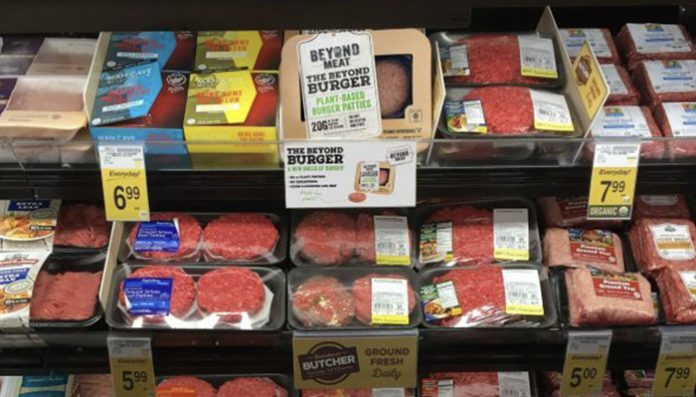Along the way, both companies have convinced some of the biggest food and retail brands in the US to sell their products. These brands can be found at Whole Foods, Burger King, White Castle, Kroger, Dunkin’, Subway, and soon perhaps even at McDonald’s. For Beyond Meat, Business was booming enough in 2019 to justify going public.
Despite the fact that Impossible Foods has racked up more product rollouts, it’s difficult to say whether one company is definitively winning the race to get in front of consumers. Impossible Foods—which chose to release its product in restaurants before grocery stores—arguably has more name recognition: It made splashy media entrances into new markets by pairing up with well-known chefs and brands.
Meanwhile, Beyond Meat—which focused on getting its products into grocery stores first—might physically be in front of more people as they roll shopping carts through supermarket meat sections.
The two companies’ strategies seemed to converge in 2019, with each wooing well-known national fast food chain brands. Beyond Meat started showing up on menu boards at Carl’s Jr., Del Taco, Tim Horton’s, Dunkin’, Subway, and KFC. Impossible Foods made headlines by getting into Qdoba and Burger King (it had already inked a deal with White Castle in April 2018).
Neither company appears to be slowing down as they head into 2020. Beyond Meat is already floating that it will expand beyond beef alternatives into poultry, according to Bloomberg; and Impossible Foods is going into the new year as America’s fourth-fastest growing brand.
Still, neither company is without competition. Plant-based alternatives to meat have existed for years and even though a newer company—such as Beyond Meat—might be growing faster, other companies still have solid yearly sales.
To keep their edge in 2020, these two leading companies will have to keep making moves into new markets, flirting with even larger restaurant partners. McDonald’s is testing the popularity of Beyond Meat in its Canadian market. If it performs well, it could give the company a huge edge in the plant-based race.
Despite the fact that Impossible Foods has racked up more product rollouts, it’s difficult to say whether one company is definitively winning the race to get in front of consumers. Impossible Foods—which chose to release its product in restaurants before grocery stores—arguably has more name recognition: It made splashy media entrances into new markets by pairing up with well-known chefs and brands.
Meanwhile, Beyond Meat—which focused on getting its products into grocery stores first—might physically be in front of more people as they roll shopping carts through supermarket meat sections.
The two companies’ strategies seemed to converge in 2019, with each wooing well-known national fast food chain brands. Beyond Meat started showing up on menu boards at Carl’s Jr., Del Taco, Tim Horton’s, Dunkin’, Subway, and KFC. Impossible Foods made headlines by getting into Qdoba and Burger King (it had already inked a deal with White Castle in April 2018).
Neither company appears to be slowing down as they head into 2020. Beyond Meat is already floating that it will expand beyond beef alternatives into poultry, according to Bloomberg; and Impossible Foods is going into the new year as America’s fourth-fastest growing brand.
Still, neither company is without competition. Plant-based alternatives to meat have existed for years and even though a newer company—such as Beyond Meat—might be growing faster, other companies still have solid yearly sales.
To keep their edge in 2020, these two leading companies will have to keep making moves into new markets, flirting with even larger restaurant partners. McDonald’s is testing the popularity of Beyond Meat in its Canadian market. If it performs well, it could give the company a huge edge in the plant-based race.
Beyond Meat and Impossible Foods don’t exist in a vacuum
|
Company |
Dollar sales |
Year-on-year growth |
|
MorningStar Farms |
$292 million |
6% |
|
Others |
$124 million |
18% |
|
Gardein |
$107 million |
14% |
|
Lightlife |
$50 million |
7% |
|
Beyond Meat |
$38 million |
101% |
|
Boca |
$38 million |
-9% |
|
Quorn |
$31 million |
19% |









